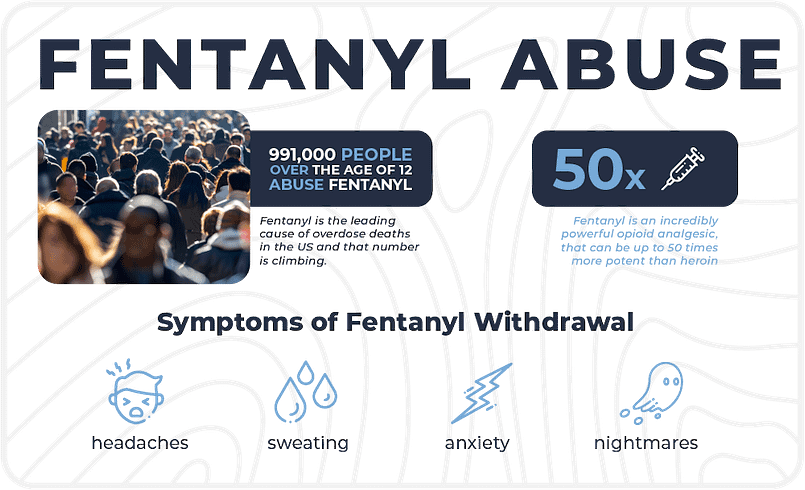
Healing Begins Here
EFFECTS OF FENTANYL ADDICTION
If you or your loved one can’t seem to control their fentanyl addiction, then now is time to get help from professional addiction specialists. Fentanyl addiction is similar to any other drug dependency. However, because fentanyl is much more potent than other painkillers, it is extremely dangerous when abused. From severe withdrawal symptoms to fatal respiratory distress, the drug can cause wide-ranging physical and mental changes. Since fentanyl is a quick-acting drug, the fentanyl withdrawal symptoms appear within a few hours of taking the last dose. Symptoms of fentanyl abuse include:
- Rapid heartbeat
- Chest tightness
- Hallucinations
- Mood changes
- Poor coordination and balance
- Pounding in ears
- Confusion
- Drowsiness
Other symptoms of fentanyl addiction include high blood pressure, nausea, cold sweats, diarrhea, and fever. A slow rate of breathing is the most dangerous side effect that can be fatal if not treated immediately. Even short-term use of fentanyl can cause addiction. Fentanyl addiction is most effectively treated in a rehab center under expert supervision, such as the addiction treatment programs at Crestview Recovery. This is because the withdrawal symptoms can be unbearable. Those with short or long-term addiction should immediately check into the best drug addiction rehab center that the Oregon region has.

GET THE HELP YOU NEED AT CRESTVIEW RECOVERY IN OREGON
MEDICATION-ASSISTED TREATMENT
WHY CHOOSE CRESTVIEW RECOVERY?
We understand that your needs are unique and tailor our addiction treatment programs to suit your specific expectations. Our focus is on making each of our patients feel comfortable and safe throughout the treatment. Our therapies help address the underlying issues, including pain, stress, or trauma.

COGNITIVE-BEHAVIORAL THERAPY
- Mindfulness meditation therapy
- Cognitive-behavioral therapy
- Dialectical behavior therapy
- Individual therapy
- Family therapy
- Group therapies
As a renowned fentanyl addiction rehab center in OR, we also offer a 12-step recovery program. The program is a step-by-step process where members take the lead and help each other heal.
When you choose us, you get the benefits of:
- Evidence-based treatment programs
- Highly individualized programs
- End-to-end support with intensive outpatient programs, partial hospitalization, detox referrals, and aftercare
- Serene environment
- Loads of fun and laughter with outdoor activities
- Experienced therapists or counselors





















